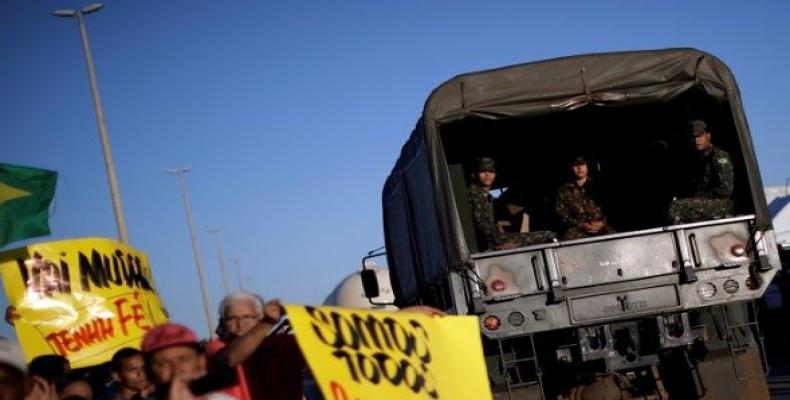Brasilia, May 29 (RHC)-- A truckers' strike paralyzing fuel, goods and food deliveries across Brazil has continued for the eighth day Monday, despite President Michel Temer's decision to cave into the drivers' key demand for lower diesel costs.
More than 550 road blockages by truckers were mounted across 24 of the country's 27 states, the federal highway police said, essentially bringing Latin America's biggest economy to its knees. The truckers are angry over the rise in costs from 3.36 reais (92 U.S. cents) a liter in January to 3.6 reais before the strike. On May 26, it hit 3.8 reais per liter.
Following urgent negotiations with representatives of the truckers, Temer agreed to cut the diesel price by 0.46 reais a liter for 60 days.
After the deal late Monday, Temer was still insisting on a way out, tweeting his "absolute conviction that this strike will end in one or two days."
But truckers outside Rio vowed to continue the strike.
Temer's concession "was nothing. It's only for two months and diesel is way too expensive. It should be reduced at least one real. People will stay here until the fight is over. It depends on the president," said truck owner Yago Marquezine, 25.
The crisis has exposed the surprising fragility of the giant economy and put Temer's lame-duck administration on the defensive ahead of October general elections.
A poll by Ideia BigData found that 95 percent of Brazilians disapproved of his handling of the situation, even if 55 percent were against the strike itself. Approval ratings for Temer and his government are in the single digits.
The current row over fuel is part of that wider conflict, with costs rising significantly since Temer's politically sensitive decision in late 2016 to allow Petrobras autonomy over its pricing. The rise in world oil prices in recent weeks has also been a factor.
"This war doesn't belong to the truckers, but to the Brazilian people!" chanted a crowd blockading the Duque de Caxias refinery outside Rio de Janeiro.
Shortages of aviation fuel paralyzed eight airports and basically shut down the huge Santos seaport near Sao Paulo, which usually receives 10,000 trucks a day and now gets only a trickle.
The Brazilian army has been ordered to intervene, with armed soldiers escorting fuel trucks on priority routes, yet enormous lines of cars were still forming at gas stations.


